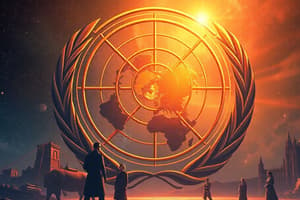Podcast
Questions and Answers
What is global governance?
What is global governance?
Global governance refers to the system of decision-making and co-operation among international actors, including states, intergovernmental organizations, non-governmental organizations, and civil society.
What is the purpose of global governance?
What is the purpose of global governance?
The purpose of global governance is to address collective concerns, mediate common interests, and create both privileges and obligations for the public and private sectors. It is also essential for solving shared problems such as pandemics, wars, and financial crises.
What is the central mission of the United Nations?
What is the central mission of the United Nations?
The central mission of the United Nations is the maintenance of international peace and security.
How does the United Nations work to maintain international peace and security?
How does the United Nations work to maintain international peace and security?
When did the United Nations come into being and why?
When did the United Nations come into being and why?
Match the following functions with the roles of the United Nations:
Match the following functions with the roles of the United Nations:
Match the following international actors with their involvement in global governance:
Match the following international actors with their involvement in global governance:
Match the following with their primary usage in global governance:
Match the following with their primary usage in global governance:
Match the following with their involvement in maintaining international peace and security:
Match the following with their involvement in maintaining international peace and security:
Match the following shared problems with the need for global governance:
Match the following shared problems with the need for global governance:
Flashcards are hidden until you start studying
Study Notes
Global Governance
- Global governance refers to the collective efforts of international institutions, organizations, and nations to address global problems and maintain international order.
Purpose of Global Governance
- The purpose of global governance is to promote peace, stability, and cooperation among nations, ensuring the well-being of people and the planet.
United Nations
- The central mission of the United Nations (UN) is to maintain international peace and security, promote sustainable development, and protect human rights.
Maintaining International Peace and Security
- The UN works to maintain international peace and security by:
- Preventing and resolving conflicts through diplomacy and negotiation
- Deploying peacekeeping operations to troubled regions
- Promoting disarmament and non-proliferation of weapons
- Supporting post-conflict reconstruction and peacebuilding efforts
History of the United Nations
- The United Nations came into being on October 24, 1945, in response to the devastating consequences of World War II, with the aim of promoting collective security, cooperation, and diplomacy.
Roles of the United Nations
- Matched functions:
- Promoting international cooperation and development
- Protecting human rights and combating human trafficking
- Providing humanitarian aid and responding to natural disasters
- Maintaining international peace and security through peacekeeping operations
International Actors in Global Governance
- Matched international actors:
- Governments: implementing policies and laws to address global challenges
- International organizations: providing a framework for cooperation and coordination
- Civil society: advocating for human rights and social justice
- Private sector: contributing to sustainable development through investment and innovation
Primary Usage in Global Governance
- Matched primary usage:
- International law: providing a framework for states to uphold human rights and prevent conflict
- Diplomacy: facilitating dialogue and negotiation to resolve conflicts peacefully
- Economic sanctions: imposing punitive measures to enforce international norms
- Humanitarian aid: providing relief and assistance to affected populations
Maintaining International Peace and Security
- Matched involvement:
- UN Peacekeeping Operations: deploying troops and personnel to troubled regions
- International mediation: facilitating dialogue and negotiation to resolve conflicts
- Conflict prevention: addressing root causes of conflict through development and diplomacy
- Post-conflict reconstruction: rebuilding and stabilizing countries after conflict
Shared Problems and Global Governance
- Matched shared problems:
- Climate change: requiring collective action to reduce greenhouse gas emissions
- Poverty and inequality: necessitating cooperation to achieve sustainable development
- Pandemics and global health crises: requiring international coordination and cooperation
- Nuclear proliferation: demanding collective action to prevent the spread of nuclear weapons
Studying That Suits You
Use AI to generate personalized quizzes and flashcards to suit your learning preferences.



